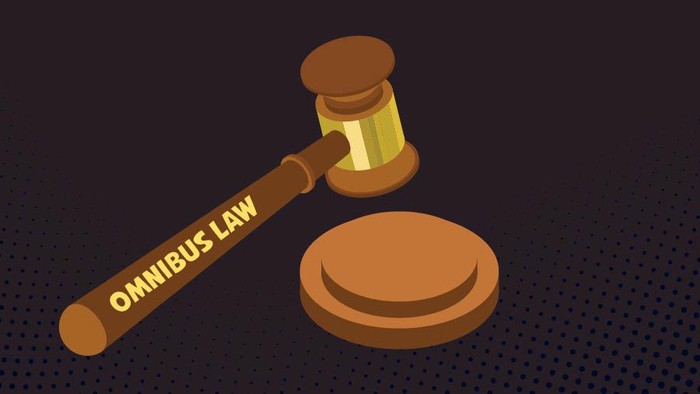Implementation of the Job Creation Law for the sake of Opening Job Opportunities
By : Naomi Leah Christine)*
People’s welfare can be built in various ways, one of which is through the implementation of the Job Creation Law which continues to focus on the field so that there are no misunderstandings between the public and the government, which actually wants to make the people’s welfare fair and equitable.
The application of the Job Creation Law (Ciptaker) continues to be intensified so that it is focused and becomes effective in the field. Chair of the Monitoring and Evaluation Working Group (Monev) of the Task Force for the Acceleration and Dissemination of the Job Creation Law, Edy Priyono said that his party was adapting again when the Perppu was passed into law, they are currently very focused on how to ensure that the provisions in the Job Creation Law can be implemented effectively.
In increasing the implementation of the Job Creation Law this time the Chairperson of the Monitoring and Evaluation Working Group (Monev) of the Task Force for the Acceleration of Socialization continues to evaluate and monitor the various regulations in place. Of course this is useful to know how these rules apply in the field. Is it running well or not. With this evaluation, Edy stated that in this short time, he would definitely follow up on the parts that were not in line with the problems that existed in the field.
On the other hand, Edy Priyono emphasized that the existence of the Job Creation Law actually expanded employment opportunities, especially for the younger generation. The reason is, what if the work force every year increases by around 2.4 million people, automatically there should also be additional jobs for them. So, with the existence of the Job Creation Law it will be easier for them to get a decent job, or for those who have an entrepreneurial spirit can easily open a business permit.
Regarding these permits, Edy stated that these obstacles still exist, because this is related to local regional regulations (Perda) and not all of them fall under the authority of the central government. In this case there are still a number of cases which will be followed up on new regulations that actually burden entrepreneurs because there are still individuals who commit acts of extortion.
The existence of these elements, in fact, becomes a challenge for the government to eradicate extortion actors evenly, at least to minimize the existence of this detrimental treatment. Therefore, if these regulations have been made and passed so that they are implemented properly, the Government cannot work alone so that this can run well, but still requires all parties concerned such as the Regional Government, civil society NGOs (Non Government Organizations), professional organizations, business actors, communities, students, and students to work together with the government to realize the policy so that it is implemented properly and is useful for the people.
Meanwhile, according to Edy, Indonesia needs to invest inside or outside the country in creating jobs. With simplified and clear licensing regulations, it will be easier to open jobs which will also return to people’s welfare. The Job Creation Law does not only side with one element, as is misunderstood by the public, but in fact the Ciptaker Law is capable of bringing justice and equal distribution of people’s welfare. This is because the Ciptaker Law also guarantees workers’ wages, which is even more important regarding the welfare of workers through an increase in the capabilities or or quality possessed by the workforce, in the sense that there is an increase in human resources (HR) and competitiveness possessed by employees. worker.
As for the matter of people’s welfare, MSME actors are not inferior in getting the benefits, one of which is that the Job Creation Law makes it very easy for MSME actors to develop their businesses. They, MSME business activists can be collateral for accessing business financing credit, the process of registering Intellectual Property Rights (IPR) has been made easier and simplified.
For this reason, the existence of the Job Creation Law itself really shouldn’t be a scourge as it is misinterpreted by the public. In fact, the existence of this rule is considered strategic in improving the national economy, the hope is to advance Indonesia so that it becomes a country that is able to compete with its neighbors in the welfare of its people. Just imagine if Indonesia was able to increase export figures, of course, if it has achieved this, people’s welfare will also be guaranteed.
In response to the public’s wrong understanding of the Job Creation Law, it is hoped that various socializations will be able to dispel the public’s fear of the Job Creation Law rules. In fact, the Job Creation Law itself is for all elements of society, both those who are not yet working and are encouraged to start businesses so that they grow well so that they are able to create new jobs. In addition, for those who are out of work or affected by layoffs or entering retirement, there is also their own guarantee. Therefore, the Job Creation Law is considered important to maintain the balance of people’s welfare.
With continued encouragement, the implementation of the Job Creation Law in the field can adjust to conditions and improve regulations. Of course, this aims to make people feel prosperous and not misunderstand the government’s intentions.
)* The author is a contributor to the Inti Nesia Media Institute
